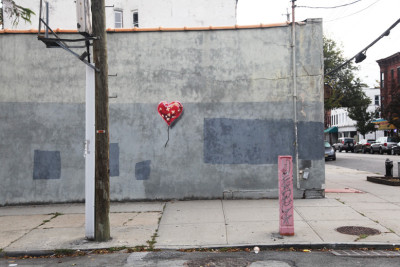
Following the first week of Banksy’s New York “Better Out Than In” street art show, the mysterious British artist has granted an email interview with the Village Voice.
“There is absolutely no reason for doing this show at all,” Banksy told the Voice. “I know street art can feel increasingly like the marketing wing of an art career, so I wanted to make some art without the price tag attached. There’s no gallery show or book or film. It’s pointless. Which hopefully means something.”
The artist says he is currently living in New York.
“The plan is to live here, react to things, see the sights—and paint on them,” he wrote. “Some of it will be pretty elaborate, and some will just be a scrawl on a toilet wall.”
Is Banksy defacing his own art? No, he says.
“I’m not defacing my own pictures, no,” he told the Voice. “I used to think other graffiti writers hated me because I used stencils, but they just hate me.”
And what about those audio clips that mock museum audio guides?
“The audio guide started as a cheap joke, and to be honest that’s how it’s continued, but I’m starting to see more potential in it now,” Banksy told the Voice. “I like how it controls the time you spend looking at an image. I read that researchers at a big museum in London found the average person looked at a painting for eight seconds. So if you put your art at a stoplight you’re already getting better numbers than Rembrandt.”
Most interesting is Banksy’s comments about maintaining credibility as a street artist. He said he made a “mistake” when, for his last New York show, he didn’t create the artwork himself.
“I totally overlooked how important it was to do it myself,” he wrote. “Graffiti is an art form where the gesture is at least as important as the result, if not more so. I read how a critic described Jackson Pollock as a performance artist who happened to use paint, and the same could be said for graffiti writers—performance artists who happen to use paint. And trespass.”
And more:
“I started painting on the street because it was the only venue that would give me a show,” he wrote. “Now I have to keep painting on the street to prove to myself it wasn’t a cynical plan. Plus it saves money on having to buy canvases.
“But there’s no way round it—commercial success is a mark of failure for a graffiti artist,” he continued. “We’re not supposed to be embraced in that way. When you look at how society rewards so many of the wrong people, it’s hard not to view financial reimbursement as a badge of self-serving mediocrity.”
My favorite part of the interview are these comments about surviving as an artist — and success.
“Obviously people need to get paid—otherwise you’d only get vandalism made by part-timers and trust-fund kids,” Banksy wrote. “But it’s complicated, it feels like as soon as you profit from an image you’ve put on the street, it magically transforms that piece into advertising. When graffiti isn’t criminal, it loses most of its innocence.
“It seems to me the best way to make money out of art is not to even try,” he wrote. “It doesn’t take much to be a successful artist—all you need to do is dedicate your entire life to it. The thing people most admired about Picasso wasn’t his work/life balance.”
For the whole story, go to the Voice.
Like this:
Like Loading...


